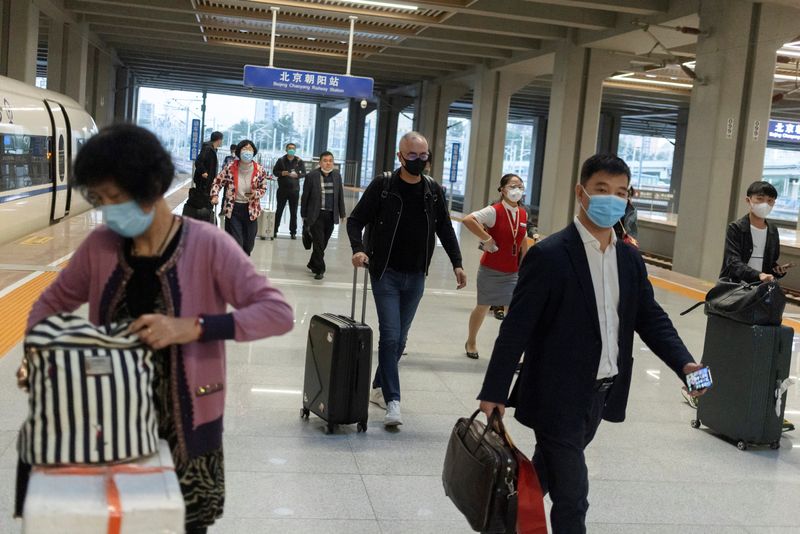China summer railway travel expected to rebound as COVID curbs ease
2022.06.30 07:31

FILE PHOTO: Travellers arrive at a train station ahead of China’s upcoming Golden Week holiday following the coronavirus disease (COVID-19) outbreak, in Beijing, China September 29, 2021. Picture taken September 29, 2021. REUTERS/Thomas Peter
BEIJING (Reuters) – As China loosens its months-long COVID-19 curbs, railway travel is expected to see an uptick in passengers just in time for the summer transport season, which starts on July 1.
By Aug. 31, the number of passenger trips on China’s railway network is expected to reach 520 million, and 10 million on peak days.
The national railway is also opening new stations such as the Xiangwan section of the Zhengzhou-Chongqing high-speed railway, the Puzheng section of the Jizheng high-speed railway, the Heruo Railway, and the Beijing Fengtai Station.
Last year, passenger trips on the national railway network totalled 462 million during the summer season, which falls during a 62-day period ending Aug. 31.
Late last summer, travel took a hit as the more infectious Delta variant caused outbreaks, pushing authorities across the country to impose measures including mass testing for millions of people as well as travel restrictions of varying degrees in August. The curbs hit the catering, transportation, accommodation and entertainment industries especially hard.
In the summer of 2020, 456 million passenger trips were made by rail. The numbers were a far cry from pre-pandemic levels when the country’s railway passenger traffic for summer 2019 was 735 million trips, an increase of 69.256 million year-on-year, or 10.4%.
On Wednesday, Beijing slashed COVID-19 quarantine requirements and tweaked its state-mandated mobile app used for local travel, sparking a rush for online searches for Chinese airline tickets on domestic and international routes.
Strict measures will still be enforced at station cars such as temperature measurement and code verification, dispersed waiting, ventilation and disinfection, reserved isolation seats, and strict control of train load rates, the railway department said on Thursday.








